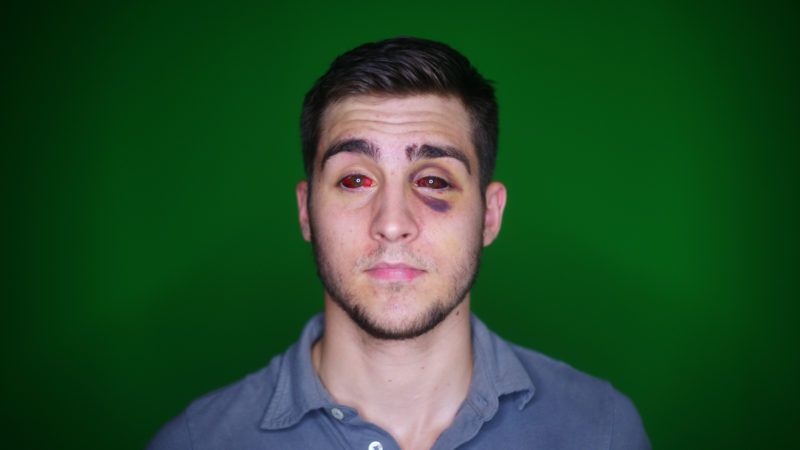SCOTUS Rules Against an Innocent Man Who Was Choked and Beaten by Cops, but He May Still Get His Day in Court
The justices did not address one of James King's key arguments, which the 6th Circuit will now consider.

The Supreme Court today unanimously ruled against James King, a Michigan man who was choked and beaten by a detective and an FBI agent after they mistook him for a fugitive who looked nothing like him. But because the decision in Brownback v. King does not address one of King's key arguments, it leaves open the possibility that he can still sue his assailants for violating his constitutional rights.
On a sunny Friday afternoon in July 2014, King, then a 21-year-old college student, was walking to a summer job in Grand Rapids when he was accosted by two unshaven men wearing jeans and baseball caps who asked his name and grabbed his wallet. When King tried to flee, the men tackled him, choked him unconscious, and punched him in the face over and over again.
"Are you mugging me?" King asked before trying to get away. As he was being choked and beaten, he cried for help and asked bystanders to call the police, which several of them did.
It turned out that King's attackers were FBI agent Douglas Brownback and Grand Rapids detective Todd Allen, members of a fugitive task force. They were looking for a 26-year-old man named Aaron Davison, who allegedly had stolen liquor and empty soda cans from his former employer's apartment. They had a driver's license photo of Davison, who bore no resemblance to King:

Since Brownback and Allen were serving on a federal task force, King sued the U.S. government under the Federal Tort Claims Act (FTCA). His lawsuit also included claims against Brownback and Allen for violating his Fourth Amendment rights, a civil remedy authorized by the Supreme Court's 1971 decision in Bivens v. Six Unknown Federal Narcotics Agents.
FTCA claims have to be viable under state tort law. U.S. District Judge Janet Neff concluded that she did not have jurisdiction under the FTCA because Michigan law gives allegedly abusive officials qualified immunity if they sincerely believed, even mistakenly, that their actions were legal. Neff therefore dismissed King's FTCA claims. She also dismissed his Bivens claims, based on the FTCA's "judgment bar," which says "the judgment in any action" under the statute "shall constitute a complete bar to any action by the claimant, by reason of the same subject matter, against the employee of the government whose act or omission gave rise to the claim."
In 2019, the U.S. Court of Appeals for the 6th Circuit revived King's claims against Brownback and Allen, ruling that Neff's dismissal of his claims against the federal government did not count as a judgment on the merits because she concluded that she lacked jurisdiction. The Supreme Court says the 6th Circuit got it wrong. Although dismissing a lawsuit based on a lack of jurisdiction ordinarily does not qualify as a ruling on the merits, Justice Clarence Thomas says in an opinion joined by all eight of his colleagues, in this case the two analyses are intertwined: The jurisdictional determination was based on the conclusion that King had not alleged a viable FTCA claim.
In a concurring opinion, Justice Sonia Sotomayor focuses on an issue that the Court's decision does not address: Does the FTCA's judgment bar nullify other claims in the same lawsuit, as Brownback and Allen argue, or does it apply only to separate lawsuits, as King maintains?
Brownback and Allen, Sotomayor notes, argue that "any order resolving an FTCA claim automatically precludes separate claims brought in the same action and arising from the same common nucleus of facts." She calls that "a significant departure from the normal operation of common-law claim preclusion, which applies only in separate or subsequent suits following a final judgment." She notes that the FTCA's judgment bar applies to "any action by the claimant," and action usually refers to a lawsuit, as opposed to a specific claim.
Brownback and Allen "contend that the FTCA gives tort claimants a choice that comes with a cost: They can sue the United States and access its deeper pockets, but, if they do, then the outcome of the FTCA claims resolves the entire controversy." That policy, they argue, "preserves federal resources while allowing tort claimants to decide whether to bring FTCA claims at all."
The upshot, however, "appears inefficient," Sotomayor says. The judgment bar is aimed at "avoiding duplicative litigation." Yet "precluding claims brought in the same suit incentivizes plaintiffs to bring separate suits, first against federal employees directly and second against the United States under the FTCA."
Sotomayor adds that the defendants' interpretation "produces seemingly unfair results by precluding potentially meritorious claims when a plaintiff's FTCA claims fail for unrelated reasons." In this case, for example, "King's constitutional claims require only a showing that the officers' behavior was objectively unreasonable, while the District Court held that the state torts underlying King's FTCA claims require subjective bad faith." If Brownback and Allen are right, "King's failure to show bad faith, which is irrelevant to his constitutional claims, means a jury will never decide whether the officers violated King's constitutional rights when they stopped, searched, and hospitalized him."
A footnote in Thomas' opinion says the Court did not resolve this issue because it did not figure in the 6th Circuit's ruling. "We leave it to the Sixth Circuit to address King's alternative arguments on remand," it says.
That leaves the ball in the 6th Circuit's court. "The Court declined to decide the strongest argument we made in this case—that the judgment bar never bars constitutional claims brought in the same lawsuit," says Institute for Justice attorney Patrick Jaicomo, who represents King. "Instead, it is sending that central issue back to the 6th Circuit to decide on remand, and Justice Sotomayor's concurrence highlights many of the arguments we made explaining why the judgment bar does not apply in that context."
In other words, Jaicomo says, "this morning's decision does not finally resolve this case." When the case goes back to the 6th Circuit, "all of the discussion about the merits no longer applies. It will cleanly have the opportunity to hold that claims brought in the same lawsuit do not cancel one another out, based on centuries of common law development."
King is happy with the outcome. "The fight continues, and this time on our terms," he says. "I'm looking forward to being back in court. The officers who assaulted me are not above the law and neither is anyone else, simply by virtue of being employed by the government."


Show Comments (30)